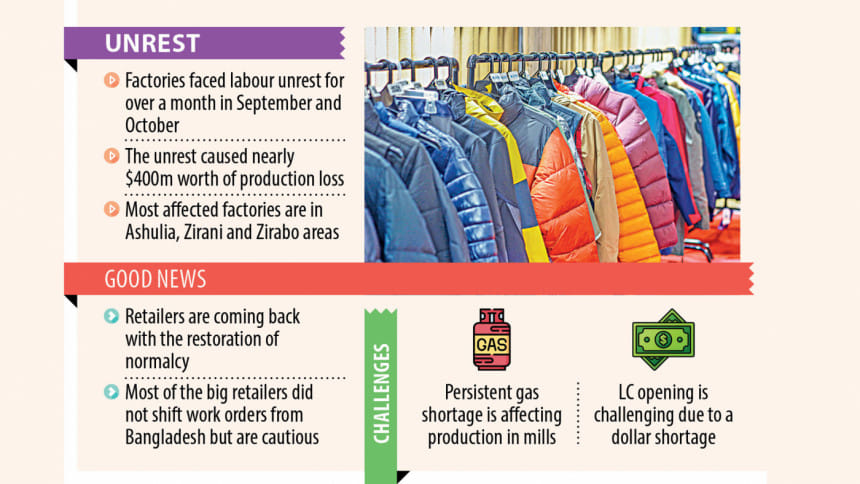RMG work orders returning as labour unrest subsides

After more than a month of disruption due to the political changeover and subsequent labour unrest in major industrial belts, international apparel retailers and brands are returning to Bangladesh with work orders for upcoming seasons.
Local garment suppliers said more Western retailers and brands are now visiting the factories and inquiring about production as normalcy has returned to the sector.
They said Western buyers are placing orders for the next autumn and winter seasons.
"I haven't noticed any major challenges in the inflow of work orders for the upcoming seasons," said Kutubuddin Ahmed, chairman of Envoy Legacy. "They haven't shifted orders away from here."
However, many factories are facing increased costs for having to make air shipments due to production delays caused by the unrest, Ahmed added.
He said a stable production environment is crucial for both suppliers and retailers.
During the unrest in September and early October, apparel factories in major industrial hubs were shuttered. Consequently, some summer orders have already been relocated to Bangladesh's rivals.
On top of the lost production and missed work orders for small and medium-sized factories, Ahmed said manufacturers are struggling as some banks are unable to open letters of credit (LCs) due to a liquidity crisis, US dollar shortage and reduced loan repayment capability of their clients.
Requesting anonymity, a major European buyer said their company did not shift any work orders out of Bangladesh due to the unrest.
"Production facilities are improving but uncertainty remains and our headquarters is concerned about the factories that were affected by the labour unrest," the buyer said.
Although buyers do not plan to reduce order quantities, overall volumes may not reach previous levels as any unrest has some negative consequences, he added.
"I have been meeting with buyers to assure them that normalcy has returned to the industrial zones and factories have resumed production," said Kalpan Hossain, managing director of Dekko Legacy Group.
Hossain's factories were shut down for 23 days in September and five days in October. This translated into a daily production loss of 80,000 pieces of trousers and jackets, valued at $4.8 lakh.
"Buyers want stability as they also need to ensure timely shipment of goods and profit," he said.
If a stable business and political environment continues, it is expected that upcoming seasons will be good for business, Hossain added.
"None of my buyers have shifted work orders so far," said Sharif Zahir, managing director of Ananta Group.
Zahir said he is hopeful that the upcoming seasons will be good as buyers are placing a significant number of orders now that normalcy has been restored.
The labour unrest was largely centred at manufacturing hubs around Dhaka. As a result, production at garment factories located in other areas was quite unscathed.
"I have work orders for the next seasons as the environment was relatively peaceful in Chattogram compared to other industrial zones in Dhaka," said Vidiya Amrit Khan, deputy managing director of Desh Group.
To sustain buyers' confidence, she said maintaining stability and a normal business environment are very important.
Requesting anonymity, a garment manufacturer from Rupganj upazila in Narayanganj said buyers are demanding discounts for their products due to shipment delays.
Apart from political stability and tight competitiveness, there are other challenges at the home front facing apparel manufacturers and textile millers. These include consistent gas and power supplies.
Khorshed Alam, chairman of Little Group, said his yarn production has declined 50 percent due to gas shortages and load shedding.
His Ashulia-based mill usually produces 24,000 pounds of yarn daily, but is now slumping to 12,000 pounds.
According to Alam, while the demand for yarn is increasing with the resurgence of garment work orders, inadequate gas supply remains a major obstacle.
Kyaw Sein Thay Dolly, managing director of Cloths R Us, said the labour unrest particularly hurt small and medium enterprises.
"Now both we and the buyers want to be optimistic," she said.
Khandoker Rafiqul Islam, president of the Bangladesh Garment Manufacturers and Exporters Association (BGMEA), said the unrest impacted autumn garment production.
He said the BGMEA will hold a meeting with representatives of international retailers and brands next week to reassure them of the restored business environment and the association's commitment to meeting deadlines.

 For all latest news, follow The Daily Star's Google News channel.
For all latest news, follow The Daily Star's Google News channel. 








Comments